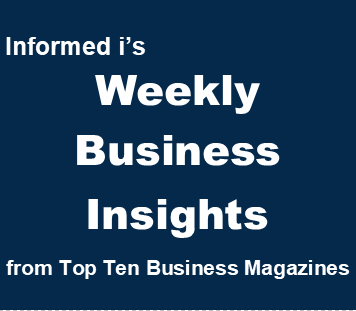
Informed i’s Weekly Business Insights
Extractive summaries and key takeaways from the articles carefully curated from TOP TEN BUSINESS MAGAZINES to promote informed business decision-making | Since 2017 | Week 387 | February 7-13, 2025 | Archive

How Hitachi hedges against a global trade war
By Peter Vanham | Fortune | February 6, 2025
Extractive Summary of the Article | Listen
3 key takeaways from the article
- As a global trade war is unfolding in a rapid and unpredictable way, companies around the world are scrambling to react. But not Andreas Schierenbeck, the CEO of Hitachi. His secret? He leads a company that is “naturally hedged” against trade and other disruptions.
- The maker of transformers and high-voltage switchgear has geography on its side. Some of its largest manufacturing facilities are in Finland, Germany, and India, but it equally produces for the U.S. in the U.S., and for Japan in Japan. But perhaps the best natural hedge is to find a niche global market, in which competitive pressure is moderate, and the growth outlook and margins are high.
- While Schierenbeck is certainly tuned-in to the rising rhetoric out of Washington D.C., he’s focused on what he can control. A trade war, he said, was less of a concern than “being too lazy or complacent.” As long as he can fight that, “We have decades of growth ahead of us.”
(Copyright lies with the publisher)
Topics: Strategy, Business Model, Supply Chain, USA, EU, Japan, Hitachi, Industrial Products, Industrial Marketing, Transformers and high-voltage switchgear, Niche Market, Competition, Hedge, Trade War, Complacent Attitude
Click for the extractive summary of the articleAs a global trade war is unfolding in a rapid and unpredictable way, companies around the world are scrambling to react. But recently the author spoke to the CEO of a multinational that seemed less worried than most. His secret? He leads a company that is “naturally hedged” against trade and other disruptions.
Andreas Schierenbeck runs Hitachi Energy, a $13 billion business headquartered in Switzerland. Its Hitachi parent company, meanwhile, is based in Japan. But the maker of transformers and high-voltage switchgear nevertheless has geography on its side, Schierenbeck told me. That’s because when it comes to production and supply chains, Hitachi hedges its bets.
Some of its largest manufacturing facilities are in Finland, Germany, and India, but it equally produces for the U.S. in the U.S., and for Japan in Japan. In September of last year, before even the Trump election, it announced $80 million worth of new facilities in Virginia and Boston to keep up with growing U.S. demand. At the same time, it invested another $75 million in its Mexico manufacturing site to service the U.S. market. “We’re analyzing all kinds of scenarios,” Schierenbeck told me.
But perhaps the best natural hedge is the last one: to find a niche global market, in which competitive pressure is moderate, and the growth outlook and margins are high. Hitachi’s competitors in the market for high-voltage switchgear, transformers, or grid automation include Mitsubishi, Siemens, GE, and Schneider Electric. Combined, this is a $90 billion industry with growth rates reminiscent of China in the early 2000s, and EBITDA margins Jack Welch would be proud of.
While Schierenbeck is certainly tuned-in to the rising rhetoric out of Washington D.C., he’s focused on what he can control. A trade war, he said, was less of a concern than “being too lazy or complacent.” As long as he can fight that, “We have decades of growth ahead of us.”
show less